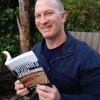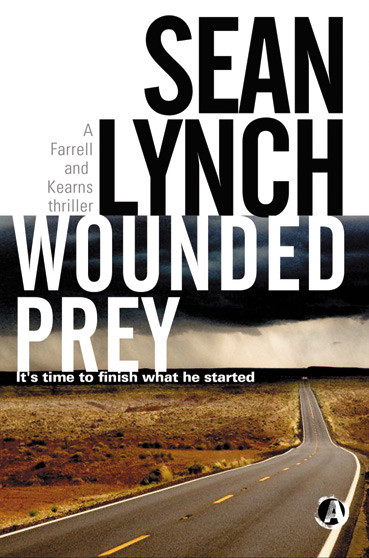 Wounded Prey is a very personal novel for me, despite being a work of fiction. It was written during a 3-4 month period over twenty-five years ago, and I would challenge any other crime-thriller author to compare my over two decades of rejections from agents and publishers with their own stack of denials.
Wounded Prey is a very personal novel for me, despite being a work of fiction. It was written during a 3-4 month period over twenty-five years ago, and I would challenge any other crime-thriller author to compare my over two decades of rejections from agents and publishers with their own stack of denials.
Of course at first I thought, “Just because my writing sucks, doesn’t mean it shouldn’t be inflicted on the reading public!” Then I read those rejections. Then I read them again. I took them to heart. I paid attention to people smarter than me. (They are not hard to find). I worked on my craft. I was diligent. So take heart, aspiring writers. ‘Never quit’ is not just a motto; for me, it is a way of life.
I am utterly delighted and indescribably grateful that through the efforts of my awesome agent, Scott Miller of Trident Media Group, and the vision of my phenomenal editor, bestselling author Emlyn Rees, Wounded Prey is now seeing the light of day.
I began work on Wounded Prey as a pressure-release valve from my police job. At the time, I was in my mid-twenties, and to my chagrin had been involuntarily reassigned from my duties as a motorcycle and S.W.A.T. cop to the Juvenile Division of my department’s Investigations Bureau. Saying I was unhappy with the transfer was like saying Kim Kardashian is somewhat coquettish.
I went from chasing cars on a Harley Davidson and kicking doors in East Oakland to wearing a tie and hiding my revolver under a suit; two things I did not want to do. I was a ‘street cop;’ I enjoyed hopping fences and pinching gun-wielding felons. I had no desire to become a ‘kiddie cop,’ which was the vernacular of the day for detectives assigned to the Juvenile Division. Not only was I unmarried and did not have kids of my own, I knew as much about kids as I did about quantum physics.
As it turned out, I could not have been more wrong about becoming a Juvenile Detective. What began as an unwanted assignment ended up being a life-changing event.
In those days, most sex crimes were investigated by Juvenile Division detectives. The running joke was, “If the case involved anyone who was a kid, or who had ever been a kid, it was dumped on the Juvenile Division.” The department’s Homicide/Robbery Division, (which I was eventually assigned to later in my career), handled all violent crimes involving adult suspects or victims. I quickly learned that the vast majority of violent crimes involved juvenile suspects and/or victims.
I earned my pay. The jurisdiction I worked for had one of the largest military installations on the west coast, and consequently a huge transitory population. As a result, our caseload was brutal.
My time in the Juvenile Division was the most emotional, traumatic, rewarding, and formative period of my career. I would eventually go on to a number of other unique assignments, but no other duty would challenge my humanity and scar me the way my time as a Juvenile Detective would.
I handled stabbings, shootings, vandalisms, drug crimes; you name it, kids do it. However, what left its mark on me most were the sex offenses. I spent my days, (and many nights and weekends), interviewing victims and identifying and tracking down the suspects in some of the most heinous and tragic crimes imaginable.
My baptism as a detective in Juvenile Division was an awakening of sorts. I learned quickly, especially when dealing with child-predators, that ignorance is no comfort. Imagine living near the ocean and surfing every day. Each morning, for perhaps twenty years, you grab your board, meet up with some pals, and hit the waves.
Then one day the surfer next to you is chomped by a shark. One minute, your buddy is there alongside you, waiting for the big one; the next minute he’s chum. As you scramble in stark terror to the shore, swearing to never enter the water again, you have an epiphany. Today wasn’t special; sharks had been there all along. You just never realized it. Sex crimes investigations taught me about sharks.
All crimes involve victims. But as every cop knows, not all victims are equal. If you are in the process of robbing, or raping, or shooting somebody, and get shot, you become a shooting victim. The cop assigned to the case will do his duty and investigate the case; just not with much sympathy. Like most cops, I’ve stood over my share of dead felons without shedding a tear. And in more than a few of those instances, I was secretly grateful my caseload would be now be reduced by the death. Cops can’t say it, because it isn’t politically correct, but the hard truth is that many victims are asking for it. Some deserve it. Not so, with kids.
It’s very difficult not to take your cases personally when they involve children. And when you spend your days hunting people who hurt children, because they like it, you naturally develop strong feelings on the topic.
The novel Wounded Prey emerged from those feelings.
Wounded Prey is a tale of the hunt. It’s not a mystery. The reader knows from page one who the villain is. It’s certainly not a story about dedicated, steely-jawed cops who enforce the law and seek justice. It’s a saga of real people, pushed to the limit and beyond, and the lengths they go to make things right. I guess you could say it’s a novel about scars.
Wounded Prey is not strictly a police procedural, although many of the tricks and tactics employed by the protagonists are ones I’ve seen used, or used myself. Like my protagonists, I’ve never been above breaking an egg to make an omelet. As any cop will confess, if you ask them right, you experience a lot of bad things ‘on the job.’ Different personalities process that trauma differently. Many quit the profession. It’s why so few cops don’t reach their pension; they get out - it’s safer to drive a truck. Many are forced out. Cops aren’t allowed bad days; one wrong decision and your career is over. Some medicate; I’ve seen too many instances of drug and alcohol abuse in my colleagues to recount. Others become numb; you’ve seen them loitering in the coffee shops, their dull eyes belying their apathy.
I don’t drink coffee; I write. I wrote Wounded Prey during a time when I needed an outlet to vent the frustrations of my day job. At a time when that job had me doing things on a daily basis that would have most people running to their shrink with fistfuls of their hair.
I already noted that Wounded Prey is a work of fiction. Yet all of the characters who inhabit the novel share a shadowy connection to a person, or composite of persons, I’ve known, and the place I was at the time of the book’s writing. That’s one of the great benefits of being a fiction writer; artistic license.
Hopefully this explains the origins and inspiration for my writing. Should this back-story further enrich the reader’s appreciation of Wounded Prey, so much the better. I have subsequently written several other novels, and with a bit of luck I’ll convince the inimitable Emlyn Rees and the good folks at Exhibit A Books to release my second novel in the Spring of 2014. I sincerely hope to continue writing, and having my work published, as long as the reading public will tolerate my literary ravings.
Wounded Prey is very special to me, and I hope the reader will find it a satisfying, if somewhat unsettling, journey. Wounded Prey is a dramatized glimpse into a world I once inhabited, and like all my writing, serves to remind how lucky I am to have survived almost thirty-years in law enforcement. It is also a tribute to the extraordinary men and women in uniform who hunt men like Vernon Emil Slocum.


Wounded Prey was published by Exhibit A Books earlier this year.
Sean Lynch was born and raised in Iowa, in a Civil War-era brick farmhouse restored by his family. When not outdoors shooting his BB guns, Sean could be found reading crime and science fiction, paranormal and military non-fiction, and trying to persuade his parents to let him stay up past bedtime to watch the late-show creature feature.
After high school, Sean obtained a Bachelor of Sciences degree and served in the U.S. Army as an enlisted Infantryman. He migrated to Northern California’s San Francisco Bay Area, where he recently retired after nearly three decades as a municipal police officer.
During his Law Enforcement career, Sean served as a Sector Patrol Officer, Foot Patrol Officer, Motorcycle Officer, Field Training Officer, S.W.A.T. Team Officer, Firearms Instructor, S.W.A.T. Team Sniper, Defensive Tactics Instructor, Juvenile/Sexual Assault Detective, and Homicide Detective. Sean concluded his career at the rank of Lieutenant and as Commander of the Detective Division.
A lifelong fitness enthusiast, Sean exercises daily and holds a 1st Dan in Tae Kwon Do. He still watches late-night creature features. Sean is partial to Japanese cars, German pistols, and British beer.
Visit Sean’s website at www.seanlynchbooks.com, follow Sean @SeanLynchBooks on Twitter, or Like his Facebook page for more information.
SHOTS' reviewer Calum MacLeod calls the book "a pretty decent cop thriller" read the whole review here.
abortion pills
website abortion pill buy online
order abortion pill online
abortion pill buy abortion pills online
where can i get the abortion pill online
abortion pill buy abortion pills online
unfaithful husbands
link why women cheat on men they love
coupons prescriptions
site prescription coupon card
cialis savings and coupons
link free cialis coupon 2016
losartan jubilant
go losartankalium bivirkninger
imodium vidal
site imodium sirop
abortion pill pictures
abcomke.sk abortion pill facts
vivitrol implant
click ldn and fibromyalgia